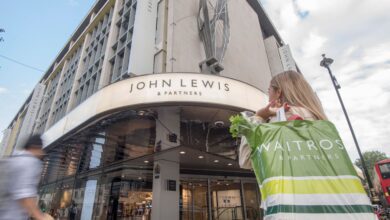A history of John Lewis
Retail Sector discovers the history of John Lewis and the history of employee ownership in Britain

In the busy British retail landscape John Lewis stands out as a high street stalwart. From its humble beginnings as a drapery shop in Victorian-era Oxford Street to its evolution into a nationwide chain of department stores, the history of John Lewis is a testament to the enduring values of entrepreneurship, innovation, and customer-centricity.
Origins and employee ownership
The story of John Lewis dates back to 1864 when John Lewis opened a small drapery shop at 132 Oxford Street in London. With a commitment to offering quality merchandise at fair prices, Lewis quickly established a reputation for reliability and integrity. His dedication to providing excellent customer service laid the foundation for what would become one of Britain’s most beloved retail institutions.
In 1905, John Lewis handed the reins of the business to his son, John Spedan Lewis, who would go on to rethink the structure of the business under his new found leadership. Inspired by the principles of profit-sharing and employee ownership, Spedan Lewis introduced the concept of the “partnership”, a model in which every employee had a stake in the company’s success. This groundbreaking approach to business ownership not only empowered employees but also fostered a culture of collaboration, innovation, and shared responsibility that remains at the heart of the John Lewis Partnership to this day.
The roots of employee ownership in the UK can be traced back to the 19th Century, a time of significant social and economic upheaval. As industrialisation transformed the landscape of work, workers increasingly sought ways to gain a greater voice in the management and direction of their workplaces. One of the earliest examples of employee ownership in the UK emerged in the form of cooperative societies, where workers pooled their resources to establish businesses that they collectively owned and managed.
The Rochdale Society of Equitable Pioneers, founded in 1844 in Rochdale, England, is often cited as the world’s first successful cooperative enterprise. Committed to the principles of democratic control, member ownership, and equitable distribution of profits, the Rochdale Pioneers laid the groundwork for a new model of economic organisation that would inspire generations of workers and entrepreneurs.
Through its unique partnership structure, which grants every employee a stake in the company’s profits and a voice in its management, John Lewis has demonstrated the power of employee ownership to foster innovation, drive productivity, and build a strong sense of community and shared purpose among workers.
Expansion and innovation
Under Spedan Lewis’s guidance, John Lewis embarked on a period of rapid expansion, opening new stores across the country and diversifying its product offerings to meet the changing needs of consumers. In 1925, the flagship John Lewis store opened on London’s Oxford Street, setting new standards for retail excellence with its expansive range of merchandise, elegant surroundings, and unparalleled customer service.
Throughout the 20th Century, John Lewis continued to innovate and adapt to the evolving retail landscape. From introducing the first self-service department store in Britain in 1953 to pioneering the concept of “never knowingly undersold”, a price-matching guarantee that remains a hallmark of the brand, John Lewis remained at the forefront of retail innovation, setting trends and raising the bar for excellence in customer experience.
Beyond its commitment to providing exceptional products and services, John Lewis has long been a champion of social responsibility and ethical business practices. From its early support for the Fairtrade movement to its dedication to environmental sustainability and responsible sourcing, John Lewis has consistently sought to make a positive impact on society and the planet.
In recent years, the company has made significant strides in reducing its carbon footprint, increasing energy efficiency, and promoting sustainable sourcing practices across its supply chain. From investing in renewable energy to reducing waste and packaging, John Lewis is committed to building a more sustainable future for generations to come.
Challenges and adaptation in the digital age
As the retail landscape undergoes seismic shifts in the digital age, John Lewis has faced its share of challenges and opportunities. The rise of e-commerce and changing consumer preferences have necessitated a reevaluation of traditional business models and a renewed focus on digital innovation and omnichannel retailing.
In response to these challenges, John Lewis has invested heavily in its online platform, expanding its digital offerings and enhancing the online shopping experience for customers. From personalised recommendations and virtual try-on tools to seamless checkout and fast delivery options, John Lewis is leveraging technology to meet the evolving needs of today’s consumers while staying true to its founding principles of quality, service, and integrity.
As John Lewis celebrates over a century of retail excellence, its legacy continues to resonate with consumers and industry stakeholders alike. From its commitment to employee ownership and social responsibility to its unwavering dedication to customer satisfaction, John Lewis remains a shining example of what can be achieved when business is conducted with integrity, purpose, and vision.
As the retail landscape continues to evolve, John Lewis stands as a beacon of stability and innovation, adapting to changing times while staying true to its core values. Whether online or in-store, customers can trust that the John Lewis brand represents quality, reliability, and a commitment to making a positive impact on the world.








